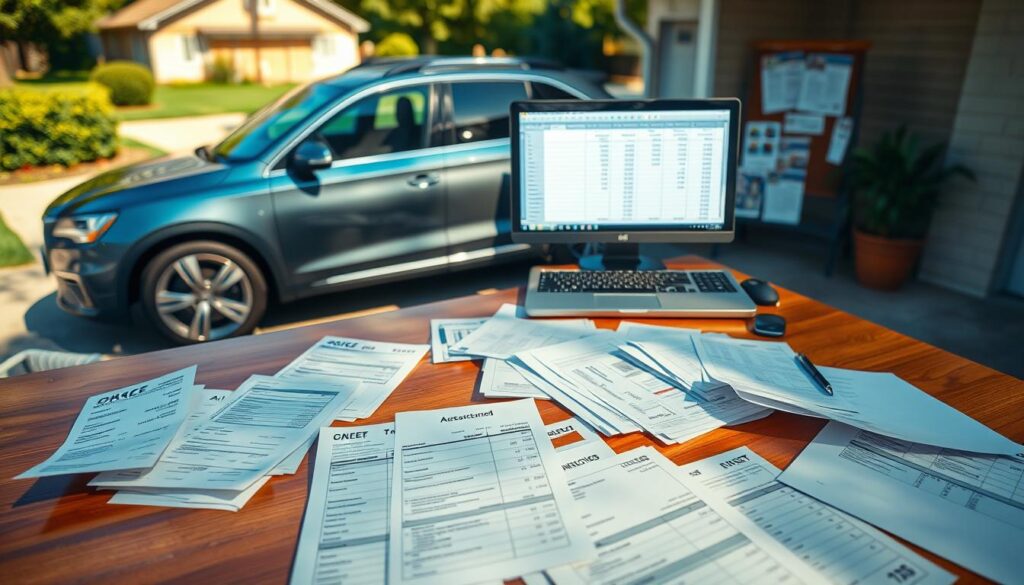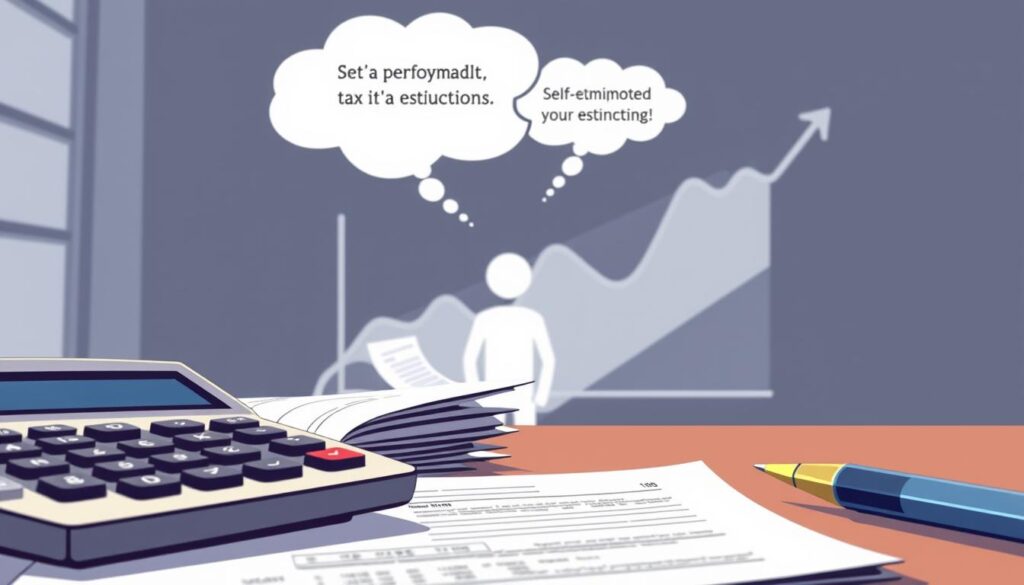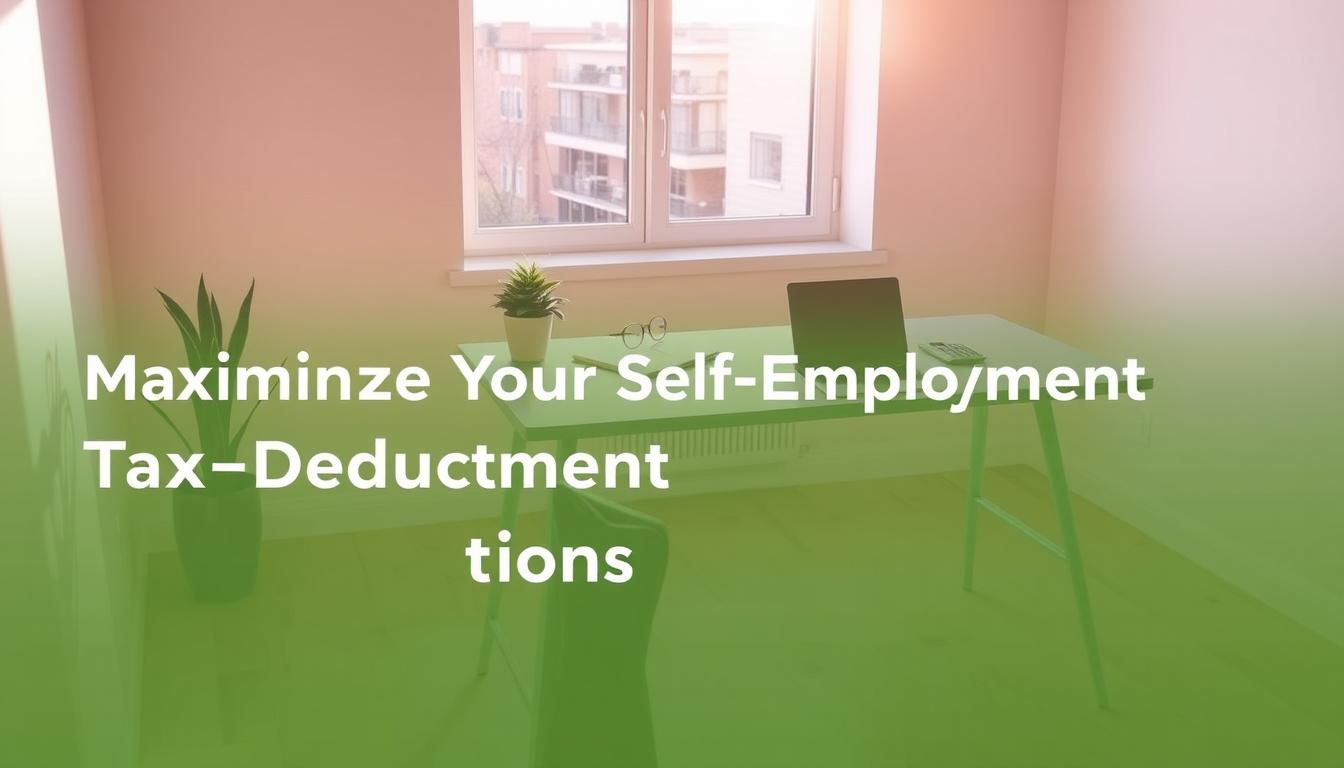As a self-employed person, knowing about tax deductions is key to lower your taxes. Deductions like home office and business expenses can save you money. It’s vital to use these deductions to cut down on taxes.
For more info on self-employment tax, check out the self-employment tax deductions page. It covers tax write-offs and other important topics.
Introduction to Tax Deductions
Tax deductions for self-employed folks can really cut down on what you owe in taxes. By taking the right deductions, you can lower your taxable income. This means you’ll pay less in taxes. It’s important to know about deductions like business expenses and health insurance.
Key Takeaways
- Understand tax deductions for self-employed to reduce tax liability
- Claim eligible deductions, such as home office deductions and business expenses
- Utilize self-employment tax deductions to minimize tax payments
- Keep accurate records of business expenses and income
- Consult a tax professional to ensure maximum tax savings
- Stay informed about tax laws and regulations affecting self-employed individuals
Understanding Tax Deductions for Self-Employed Individuals
If you work for yourself, knowing about tax deductions is key. Deductions are costs you can subtract from your income before taxes. This can lead to big savings on taxes. For example, you can deduct home office and travel costs, which can save you a lot.
There are big differences in what employees and self-employed people can deduct. Self-employed folks can deduct business costs on their taxes. But, employees can only deduct job-related costs like uniforms or travel. Knowing these differences helps you save more on taxes.
Some common things self-employed people can deduct include:
- Home office expenses, such as rent or mortgage interest, utilities, and office supplies
- Business travel expenses, such as transportation, meals, and lodging
- Business equipment and supplies, such as computers, printers, and software
By using these deductions, you can lower your taxable income. This means you pay less in taxes. Keeping good records of your expenses is crucial. It helps you claim these deductions on your taxes and save more.
Common Tax Deductions Available
Self-employed folks can lower their taxable income with various tax deductions. These can be found on a self-employed tax deductions checklist. It includes home business use, business expenses, and health insurance premiums. Knowing these deductions can help maximize tax benefits for self-employed individuals.
Home Office Deduction
The home office deduction is for self-employed folks who work from home. It covers costs like rent, utilities, and equipment for a dedicated business space.
Business Expenses
Business expenses are another deduction for self-employed people. This includes office supplies, travel, and equipment. A checklist can help ensure all eligible expenses are claimed.
Health Insurance Premiums
Self-employed folks can deduct health insurance premiums as a business expense. This includes premiums for themselves and their families. Understanding these deductions is key to saving on taxes.
Some common tax deductions for self-employed individuals include:
- Home office expenses
- Business use of a car
- Travel expenses
- Equipment and supplies
- Health insurance premiums
By using these tax deductions, self-employed individuals can lower their taxable income. It’s important to keep accurate records and consult a tax professional. This ensures all eligible deductions are claimed.
| Deduction | Description |
|---|---|
| Home Office Deduction | Deduction for business use of a home |
| Business Expenses | Deduction for business-related expenses |
| Health Insurance Premiums | Deduction for health insurance premiums paid |
Keeping Accurate Records for Deductions
Keeping accurate records is key for self-employed folks to enjoy self-employed tax savings and self-employed tax benefits. Detailed records help ensure you claim all tax write-offs for self-employed and get the most deductions.
Self-employed folks can use spreadsheets or accounting software to keep records. It’s also crucial to save receipts and invoices for business expenses. These can back up tax write-offs for self-employed. Some important documents to keep include:
- Business expense receipts
- Invoices and contracts
- Bank statements and cancelled checks
- Mileage logs and travel records
By keeping accurate records and staying organized, self-employed folks can make the most of self-employed tax benefits and self-employed tax savings. This can lower their taxes and boost their profits.
Also, self-employed folks can talk to a tax pro for help with tax write-offs for self-employed. They can get advice on how to increase self-employed tax savings.
| Document Type | Importance | Retention Period |
|---|---|---|
| Business expense receipts | High | 3-5 years |
| Invoices and contracts | High | 3-5 years |
| Bank statements and cancelled checks | Medium | 1-3 years |
Deductions for Vehicle Expenses

If you work for yourself, you might get tax deductions for self-employed on vehicle costs. This includes gas, maintenance, and insurance. You need to use your vehicle for work, like going to client meetings or moving goods.
There are two ways to figure out your vehicle costs: the standard mileage rate or actual expenses. The standard rate is a fixed amount per mile for work. Actual expenses mean you deduct the real cost of using your vehicle. For more on scaling your small business and managing expenses, check out this link.
To get the most out of self-employment tax deductions, keep good records of your vehicle costs. This includes gas, maintenance, and insurance receipts, plus a log of business miles. Using these deductions can lower your taxable income and taxes.
- Gas and fuel costs
- Maintenance and repair costs
- Insurance premiums
- Registration and licensing fees
Knowing what expenses you can deduct and keeping good records helps you use tax deductions for self-employed to your advantage. This way, you can pay less in taxes.
Deductible Business Expenses Explained
As a self-employed person, knowing what expenses you can deduct is key. This helps lower your taxes and boosts your earnings. A checklist of self-employed tax deductions can guide you. There are many types of deductible business expenses, like office supplies and marketing costs.
Office Supplies and Equipment
Expenses like paper, pens, and toner are deductible. So are business equipment, like computers and printers, if they’re mainly for work. Keeping receipts and records is crucial to claim these expenses.
Marketing and Advertising Costs
Marketing and ad costs, such as website development and social media ads, are also deductible. These help you attract new customers and grow your business. Including these in your tax write-offs can lower your taxable income and taxes. For more on business planning and expenses, check out business planning resources.
Securing Deductions for Retirement Contributions
As a self-employed person, getting deductions for retirement contributions is key to saving on taxes. These deductions help lower your taxable income and tax bill. This can mean more money in your pocket and less financial worry.
To get these deductions, you need to set up a qualified retirement plan like a SEP-IRA or solo 401(k). These plans let you contribute to your retirement before taxes. This way, you can lower your taxable income and save on taxes, leading to more savings for you.
Self-Employed Retirement Plans
Self-employed retirement plans, like SEP-IRAs and solo 401(k)s, offer great flexibility and benefits. For instance, SEP-IRAs let you contribute up to 20% of your net earnings from self-employment. Solo 401(k)s allow contributions of up to $57,000 in 2023. Plus, they offer tax deductions, making them a smart choice for saving on taxes.
Contribution Limits and Benefits
The limits and benefits of self-employed retirement plans vary. But all plans provide big tax benefits, like lower taxable income and more cash flow. By contributing to a plan, you can also cut your tax bill, leading to more savings. Some main benefits include:
- Flexible contribution limits
- Tax deductions for self-employed individuals
- Increased cash flow and reduced financial stress
- Reduced taxable income and lower tax liability
Deducting Professional Services Costs
As a self-employed person, knowing what professional services costs you can deduct is key. This includes fees for accountants, lawyers, and more. It’s important to keep good records of these costs. This way, you can include them in your self-employed tax deductions checklist.
A self-employed tax deductions checklist helps you stay organized. It makes sure you don’t miss any deductible expenses. Here are some examples of deductible costs:
- Accountant fees for tax preparation and planning
- Legal fees for business-related matters
- Consulting fees for business strategy and development
Deducting these costs can lower your taxable income. It’s wise to talk to a tax expert. They can help you make the most of tax write-offs for self-employed individuals.
Calculating Professional Services Costs
To figure out these costs, keep detailed records of all fees paid. This includes invoices, receipts, and bank statements. Keeping accurate records helps you claim all eligible deductions. This way, you can reduce your tax liability.
Impact of Deductions on Estimated Taxes

As a self-employed person, knowing how tax deductions work is key. Deductions for business expenses can lower your taxes a lot. This means you pay less in taxes and avoid overpaying.
To figure out your estimated taxes, think about your deductions. This includes business expenses, home office costs, and more. Use Form 1040-ES to estimate and make quarterly payments to dodge penalties.
How Deductions Affect Tax Liability
Deductions for self-employed folks can really cut down your taxes. By subtracting business costs, you lower your taxable income. This, in turn, lowers your taxes. For instance, a home office can let you deduct part of your rent or mortgage. This can save you a lot on taxes.
Preparing for Quarterly Payments
To get ready for quarterly payments, you need to estimate your taxes. Then, make payments every quarter. Here’s how to do it:
- Use Form 1040-ES to figure out your taxes.
- Find out when your quarterly payments are due.
- Pay on time to avoid fines.
By following these steps and using tax benefits, you can lower your taxes. Always talk to a tax expert if you’re unsure about your taxes or deductions.
State-Specific Deductions for Self-Employed
If you work for yourself, knowing about state-specific deductions is key. A self-employed tax deductions checklist can guide you. It helps you use all the tax write-offs for self-employed people in your state. Remember, tax benefits for self-employed folks differ by state, so it’s important to learn what’s available in your area.
When looking into local tax laws, think about these things:
- State income tax rates
- Business registration needs
- Local tax breaks for self-employed folks
These points can change how much you save on taxes. So, it’s vital to get them right.
Overview of State Tax Deductions
Some states give more tax breaks to self-employed people than others. For instance, some states let you deduct business costs on your state tax form. Others might give credits for certain industries or business types. Knowing about these deductions can help you save more on taxes.
Researching Local Tax Laws
To find out about local tax laws and use state-specific deductions, talk to a tax expert or check online resources. This way, you can keep up with tax changes in your state. By doing this, you can lower your taxes and get the most out of your self-employed tax benefits.
| State | Self-Employed Tax Deductions |
|---|---|
| California | Business expense deductions, home office deductions |
| New York | Business income deductions, self-employment tax deductions |
| Florida | No state income tax, business expense deductions |
Conclusion: Enhancing Tax Savings
Maximizing tax deductions is key for self-employed folks to cut down on taxes and increase their earnings. It’s important to keep your tax strategies up to date. This way, you can make the most of all the deductions you’re eligible for.
Regularly Review and Update Your Tax Strategies
Tax laws and rules can change, so it’s vital to stay current. Check your business expenses and how you keep records often. Also, look at your retirement plans to find new ways to save on taxes.
Consult a Tax Professional for Personalized Guidance
This article has covered many tax deductions for the self-employed. But, getting advice from a tax expert is even more valuable. They can help you understand tax laws, find special deductions for your business, and make sure you’re saving on taxes all year.
Being proactive and getting professional help can really help self-employed people save on taxes. Knowing about tax deductions helps you reduce your tax burden. This lets you focus on growing your business.
FAQ
What are the most common tax deductions available for self-employed individuals?
Self-employed folks can deduct home office expenses and business costs like office supplies and marketing. They can also deduct health insurance, vehicle expenses, retirement contributions, and professional fees.
How can self-employed individuals keep accurate records for tax deductions?
Keeping good records is key for self-employed folks to claim deductions. They should save receipts, invoices, and mileage logs. Using accounting software or spreadsheets helps track expenses. Knowing what to keep and for how long is also crucial.
What are the key differences in tax deductions for employees versus self-employed individuals?
Self-employed folks get more deductions, like home office and health insurance. They also pay self-employment tax, which affects their taxes and deductions.
How can self-employed individuals maximize their vehicle expense deductions?
They can use the standard mileage rate or actual expenses method for vehicle deductions. The actual expenses method might give higher deductions if costs are high. Keeping a mileage log is essential for either method.
What retirement plans are available for self-employed individuals, and how can they deduct contributions?
Self-employed folks can contribute to Solo 401(k), SEP IRA, or SIMPLE IRA plans. These contributions can be deducted from taxable income. It’s important to choose the right plan for your needs.
How can self-employed individuals deduct the costs of professional services, such as accountants and lawyers?
Self-employed individuals can deduct fees for accountants, lawyers, and consultants. These deductions help offset business costs, as long as the services are related to their work.
How do tax deductions impact the estimated taxes that self-employed individuals must pay?
Deductions can lower a self-employed person’s tax liability. This affects the estimated taxes they must pay. Understanding this can help avoid penalties and interest.
Are there any state-specific tax deductions available for self-employed individuals?
Yes, many states offer tax deductions for self-employed folks. These include deductions for business expenses, retirement contributions, and more. It’s vital for self-employed individuals to check their state’s tax laws for available deductions.


